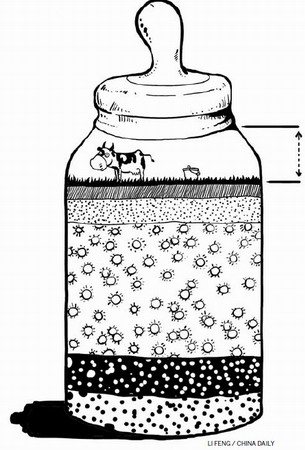Opinion
Debate: Safe milk
(China Daily)
Updated: 2011-06-27 15:04
 |
Large Medium Small |
Three experts lock horns on this important issue.
Nada Mude
Standards reflect reality on the ground
Since dairy products are related directly to public health, they have to be safe for human consumption. In other words, people's health should be the prime concern while setting national dairy safety standards.

The existing safety standards for dairy products, however, do not measure up to the mark. The government relaxed the national dairy products' standards last year, increasing the higher limit of bacteria in raw milk from 500,000 to 2 million per milliliter and lowering the protein requirement from 2.95 grams to 2.80 grams per 100 grams of milk.
There is no doubt that the health department factored in consumers' health when it set the national standards. Every consumer wants high-quality products. But if most of the dairy companies cannot meet the standards set by the health department, it would defeat the very purpose of having national food standards.
The reality is that more than 70 percent of the dairy farmers in China have small-sized farms where they rear free-range milk cows. Farms with 100 or more cows comprise less than 30 percent of the total. Since small farmers often feed their cattle whatever they grow on their farms, the protein content in the milk is not stable.
A Ministry of Agriculture survey showed that in the summer of 2007, the protein content in about 75 percent of the raw milk collected from farmers in northern China was less than 2.95 grams per 100 grams. The next year, the percentage went up to 90. The percentage of the raw milk purchased by a certain dairy company this month from northwest, central and northeast China that did not have 2.95 grams of protein per 100 grams was 75.8, 33.8 and 24.9.
A majority of the small, free-range farms have poor sanitary conditions. And since farmers who run them take no special post-milking preservation measures, bacteria multiply rapidly in the raw milk. It is thus important to set proper standards for all the stages of processing in the dairy industry to protect consumers' health and create a healthy environment for its development.
The top priority now is to expand the scale and enhance the quality of cattle farms to ensure the supply of enough raw milk.
It would be a good idea to raise the standards to improve the quality of milk sold in the market. But any deviation from reality will take a heavy toll on the dairy industry. If the standards of countries that have a developed milk industry are adopted in China, up to 70 percent of the small farmers would go bankrupt and the supply of raw milk would be reduced to a trickle.
|
||||
However, domestic dairy companies no longer enjoy consumers' trust. Cattle farmers, dairy companies, industry associations and the government cannot shirk their responsibilities to improve the quality of milk and regain public trust.
Cattle farms are crucial to dairy products' quality. The government can help them directly to improve their sanitary conditions and milk-preservation methods, or standardize the cattle farms. Or, it can help set up cooperatives in the dairy industry. Large dairy companies, too, can set up their own cattle farms to ensure the supply of quality milk.
But in our bid to improve the quality of dairy products, we should not forget to protect the dairy industry.
The author is secretary-general, Dairy Association of the Inner Mongolia autonomous region. The article first appeared in the People's Daily.
| 分享按鈕 |



